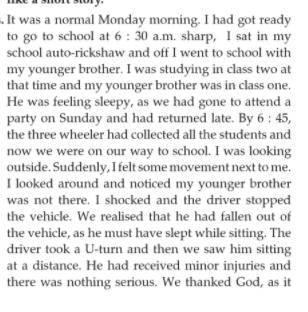Ncert words and expression solution (UNIT 3)
LET`S BEGIN
Q.1. The young seagull was afraid of flying because
Ans-he felt his wings would not support him
Q.2. Why did his family taunt him about his cowardice?
Ans-He was not accepting their request to fly with them.
Q.3. How did the young seagull start flying?
Ans-His mother showed him the fish and moved away from him to make him fly.
Q.4. Which of the following statements is not true of the young seagull?
Ans-He was lazy and did not want to fly.
Q.5. Say whether the following statements about the seagull are true or false.
Ans- The young seagull liked to fly with his brothers and sisters. (T )
The young seagull was hungry so he started to fly. (T )
He was scared of flying first. (T )
He flew on his own to get the food. (T )
2. You have another story, ‘The Black Aeroplane’ in the lesson. Read the story again and develop at least five multiple choice questions based on the story. Work in pairs and ask your partner to answer them. The questions may be based on the events, persons, reasons and causes of the events, and results in the story.
1)What was the name of the Plane used During Journrey?
a) Darkota b)F-16 c)Miraj d)Miraj 16
2)Where was plane Trapped?
a)Between Sand dunes b)Between Storm clods c)none d) between oceans
3) Pilot wanted to take what?
a) English Launch b)French lunch c)English Dinner d)French Dinner
4)Why was pilot worried after 2nd time(even after seeing the black plane)
a)was frightened seeing black areoplane
b)plane had very less fuel
c)he was not worried
d)he was happy
5)KUDH KUCH KARLO NALAYANKONO😅😅WARNA COMMENTS KOI BOLDEGA PUCH LO
READING COMPREHENSION
VOCABULARY
1. Making adverbs: bitterly, imperturbably, violently, and evidently are some words you have come across in the story. These are adverbs. A few words are given below. Make adverbs of these words and use them in sentences of your own. (Take care of the spelling when you convert these into adverbs.
3.Form antonyms by prefixing ill- and in-
2. formal - informal | |
3. active- inactive | |
4. sufficient - insufficient | |
a. walk in (adjective ) -not arranged in advance
Last week I attended a walk-in interview.
b. walk out - to leave a meeting, performance, etc. suddenly, especially in order to show that you do not like or approve of it
Eg:-The terrorists hinted that they would walk out of the peace talks.
c.take away- to make a feeling, pain, etc. disappear
I was given some pills to take away the pain.
d. take up- to continue, especially starting after somebody / something else has finished
The band's new album takes up where their last one left off.
e. take in - to allow somebody to stay in your home
He was homeless, so we took him in.
- to understand or remember something that you hear or read
Halfway through the chapter I realized I hadn't taken anything in.
f. take out - remove it from its place.
Henry took out his wallet.
g. give away - to present something
The President gave away the prizes at the school sports day.
h. give in- to admit that you have been defeated by somebody/something
The rebels were forced to give in.
i.give up - to stop trying to do something before you have finished, usually because it is too difficult:
She has a struggle trying to persuade the board to accept her proposal, but she's determined not to give up.
j.put in- to spend a lot of time or make a lot of effort doing something
She often puts in twelve hours' work a day.
k. put away-to save money to spend later
Rita has a few thousand rupees put away for her retirement.
l. put out -to stop something from burning or shining
Firefighters soon put the fire out.
B. THE PASSIVE
(a) Taj Mahal was built by Shah Jahan.
(b) Malaria virus is transmitted by female Anopheles mosquito.
(c) The case has been solved by police and two persons have been arrested.
(d) Many houses and lives were destroyed by the volcanic eruption
in Mt. Etna.
(e) The ultraviolet rays are prevented by the ozone layer from entering the earth’s surface.
(f) The field has been converted to playground.
C.UNSCRAMBLE
(a)Amelia Earhart was an American aviator who set many flying
records.
(b) She became the first woman to fly solo across the Atlantic Ocean
(c) During a flight to circumnavigate the globe, Earhart disappeared somewhere over the Pacific in July 1937.
(d) Her plane wreckage was never found, and she was officially declared lost at sea.
e) Her disappearance remains one of the greatest unsolved mysteries of the twentieth century
LISTENING
WRITTING
You have read and experienced how the little seagull learnt to fly and then the story of the mysterious black aeroplane. You have also read the story, ‘All about a dog’. How were these experiences? You may have also experienced some such situations in your life: learning to ride on a bicycle, watching a cat or any other animal trying to jump over the wall, your own bitter experience in a difficult situation, etc. Think of such an experience and write down the points and develop the ideas into an outline. Write your experiences like a short story
.....contd
ALWAYS BE SMILING 😀😁






5 comments